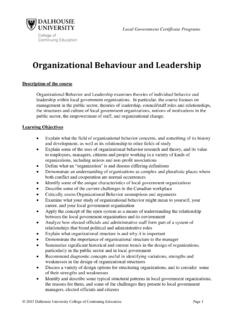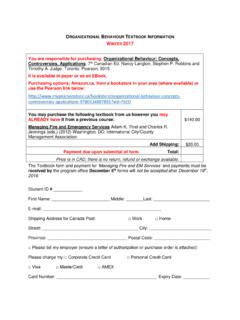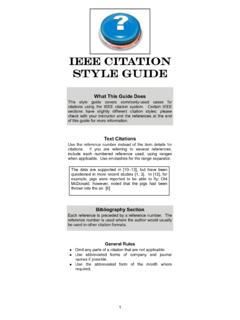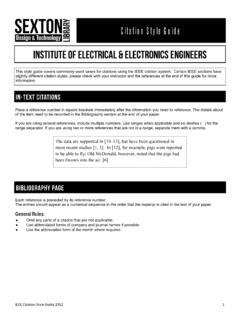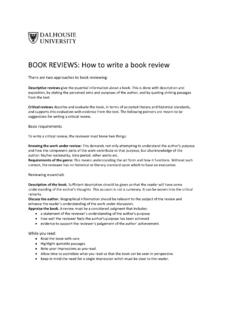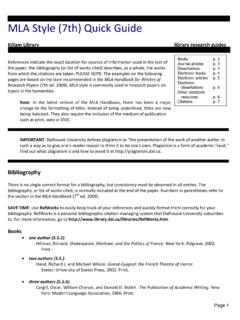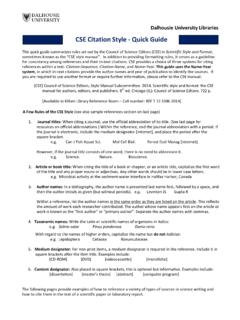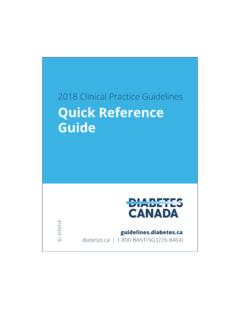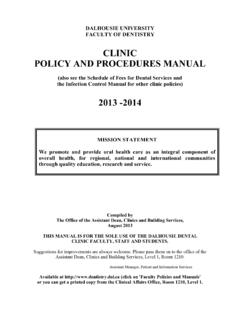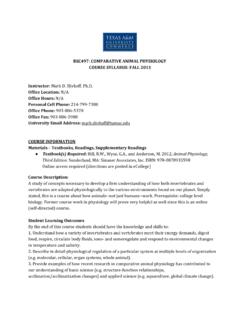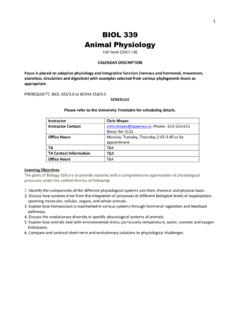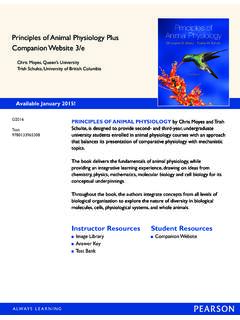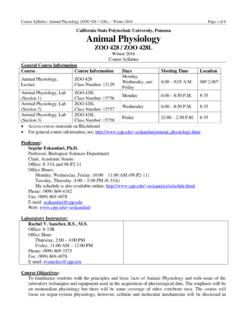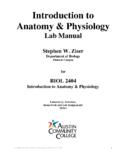Transcription of Faculty of Science Course Syllabus Department of Biology ...
1 Faculty of Science Course Syllabus Department of Biology BIOL 3079 and MARI 3076 animal physiology and Marine animal physiology , Part II Winter, 2017 Instructor(s ): Dr. Alan Pinder; room 4130 Dr. Nancy McAllister-Irwin; room 6130 Lectures: M, W, F; 8:35 9:25 LSC 236 Laboratories: Room 7009, 3 hours BIOL 3079 B01: Monday, 2:30-5:30pm, Room 7009, Biology Department . B02: Tuesday, 2:30-5:30pm, Room 7009, Biology Department . MARI 3076 B01: Wednesday, 1:30-4:30pm, Room 7009, Biology Department . B02: Thursday, 10:00-1:00pm, Room 7009, Biology Department . _____ Course Description This Course is a continuation of a discussion of the mechanisms which coordinate the activities of cells within multicellular organisms which began in BIOL This term emphasizes the urinary, cardiovascular and respiratory systems.
2 The laboratories reflect the approaches taken to s tudy thes e s ys tems in a variety of organis ms . LECTURE HOURS PER WEEK: 3 LAB HOURS PER WEEK: 3 PREREQUISITES: BIOL or MARI CROSS-LISTING: MARI EXCLUSIONS: BIOA Course Objectives/Learning Ou t comes Skills in BIOL 3078/79 and MARI 3074/76 Communication skills Writing of formal l aboratory secti ons better understanding of grammatical rules Oral communication skills using various media (Powerpoint, videos, etc) of an article from the primary literature Discussion skills obtained in seminars Critical thinking Cri ti cal analys is of scientific journal paper Analysis/interpretation of scientific journal papers for experimental exercises Analysis and interpretation of data from experimental exercises and computer simulations Li br a r y/web s ea r c h s ki l ls Conduct literature and online searches of primary and secondary sources using electronic data bases and online search tools Computer skills Use of computer software for word processing and data analysis Use of interactive simulations to integrate physiological concepts Statistical/data analysis
3 Use of statistical packages to display graphs and charts for assignments Teamwork skills Work in pairs or small groups to develop data for assigned experiments Problem solving Problem solve in many laboratory and simulation exercises Practical skills Basics dissection, microscopy, micrometers, pipetting, spectrophotometry, chemical dilutions, titrations, animal handling, chemical and laboratory safety concepts Specific el ec tr o-physiological transducers, recording oscillographs, pulse stimulators Digital plethysmographs, blood pressure cuff, ECG Human sensory physiology systems for vision (Snellen, astigmatism, Ichikawa, blind spot charts), hearing a cti vi ty, touch, ta s te a nd s mel l tes ts Reflexes (patella, corneal, papillary, ciliospinal, consensual, vestibular Human renal recording (osmometers, specific gravity meters, chloride ion titrations Circulatory physiology identification of blood vessels and cells, hematocrit determinations, haemoglobin measurements Respiratory and exercise physiology s pi r ometer s , di s s ol ved oxygen meter s Course Materials Hill, R.))
4 , G. Wys e and M. Anders on. animal physiology . third edition . 2012. Knisely, K. A Student Handbook for Writing in Biology . Fourth edition . 2004. Course Assessment Problem sets 15% Participation 5% Laboratory as s ignments (reports , quizzes , exam) 40% 1 Final lecture exam 40% Total 100% The Final exam and Laboratory exam will be combined and written together during the regular examination period scheduled by the Registrar s office during the official examination time at the end of the term. Please ensure your travel plans do not overlap with the examination period, as this is not a valid excuse for deferring or advancing a final examination.
5 Laboratory assignments and evaluation information are given in the laboratory manual. This class subscribes to a Brightspace Learning web-bas ed s ervice that checks for originality in s ubmitted papers . Conversion of numerical grades to Final Letter Grades follows the Dalhousie Common Grade Scale A+ (90-100) B+ (77-79) C+ (65-69) D (50-54) A (85-89) B (73-76) C (60-64) F (<50) A- (80-84) B- (70-72) C- (55-59) Course Policies Please inform us in advance if you are unable to attend your final exam. It will normally only be rescheduled for illness, and we will require a medical certificate from your doctor. Make up exams will be given within one week of the s cheduled exam date at a mutually convenient ti me.
6 PLEASE NOTE: We are NOT obligated to providing you with make-up exa ms for mi dterms or alternate dates for seminars, but will do so as long as the student presents us with a valid s ick note. Course Content Tentative Lecture Schedule BIOL 3079 and MARI 3076, Winter 2017 Week of Da y Lec. # Topic Jan 9 - 13 Mon Introduction & Administration Wed Water and Salt physiology : Intro and Mechanisms Fri Jan 16 - 20 Mon Ionic and Osmotic Adaptation (freshwater, estuaries and shorelines) Wed Ionic and Osmotic Adaptation (marine) Fri Water Conservation in Terrestrial Animals Jan 23 - 27 Mon Excretory Organs Wed Regulating Filtration and Countercurrent Exchange Fri Renal Ion and pH Regulation Jan 30 Feb 3 Mon Energy Metabolism.
7 Intro Wed Metabolic rate 1 Fri Munro Day no classes Feb 6 - Feb 10 Mon Meta bol i c Ra te 2 Wed Aerobic and Anaerobic Forms of Metabolism Fri The Energetics of Aerobic Activity Feb 13 - 17 Mon Temperature and its effects Wed Thermal relations - Ectothermy Fri Thermal relations - Homeothermy Feb 20 - 24 Spring Break - no classes Feb 27 Mar 3 Mon Warm-bodied fish and Insects Wed Life in the cold - Thermal adaptations Fri Oxygen and Carbon Dioxide physiology Mar 6 - 10 Mon External Respiration: Intro Wed Breathing by Aquatic Invertebrates and Fish Fri Breathing by Terrestrial Animals other than Mammals Mar 13 - 17 Mon Breathing by Mammals Wed Blood gas transport: blood pigments Fri Carbon Dioxide Transport and Acid-Base Balance Mar 20 - 24 Mon Circulation.
8 Myogenic and Neurogenic Hearts Wed Principles of Pressure, Resistance, and Flow in Vascular Systems Fri Circulation in Mammals and Birds Mar 27 - 31 Mon Circulation in Fish Wed Circulation in Invertebrates Fri Depth problems, Buoyancy, and Locomotion Apr 3 - 7 Mon Diving by Marine Mammals Wed TB A Fri TB A Apr 10 Mon TB A ACCOMMODATION POLICY FOR STUDENTS Students may request accommodation as a result of barriers related to disability, religious obligation, or any characteristic protected under Canadian Human Rights legislation. The full text of Dalhousie s Student Accommodation Policy can be accessed here: Students who require accommodation for classroom participation or the writing of tests and exams should make their request to the Advising and Access Services Centre (AASC) prior to or at the outset of the regular academic year.
9 More information and the Request for Accommodation form are available at ACADEMIC INTEGRITY Academic integrity, with its embodied values, is seen as a foundation of Dalhousie University. It is the responsibility of all students to be familiar with behaviours and practices associated with academic integrity. Instructors are required to forward any suspected cases of plagiarism or other forms of academic cheating to the Academic Integrity Officer for their Faculty . The Academic Integrity website ( ) provides students and Faculty with information on plagiarism and other forms of academic dishonesty, and has resources to help students succeed honestly. The full text of Dalhousie s Policy on Intellectual Honesty and Faculty Discipline Procedures is available here: STUDENT CODE OF CONDUCT Dalhousie University has a student code of conduct, and it is expected that students will adhere to the code during their participation in lectures and other activities associated with this Course .
10 In general: The University treats students as adults free to organize their own personal lives, behaviour and associations subject only to the law, and to University regulations that are necessary to protect the integrity and proper functioning of the academic and non academic programs and activities of the University or its faculties, schools or departments; the peaceful and safe enjoyment of Uni ve rsity facilities by other members of the University and the public; the freedom of members of the University to participate reasonably in the programs of the University and in activities on the University's premises; the property of the University or its members.
